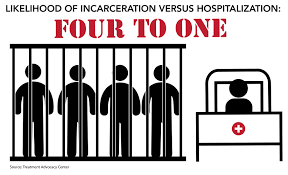
EVERY NAMI AND MHA GROUP IN OUR COUNTRY SHOULD CUSTOMIZE THE MEDICAL FORM MENTIONED IN THIS BLOG AND BEGIN USING IT! LOCAL CHAPTERS SHOULD ALSO PRODUCE A MANUAL THAT GUIDES PARENTS AND OTHERS ABOUT WHAT TO DO IF SOMEONE THEY LOVE WITH A MENTAL ILLNESS IS ARRESTED IN THEIR LOCAL JURISDICTION.
(11-4-19) Mark Gale became alarmed when his son was arrested and jailed in Los Angeles’ Twin Towers. He wanted the correctional officers to know that his son had a serious mental illness and what medications helped him.
But there was no obvious way for him to communicate his son’s diagnosis or his background to those who were guarding him.
Although Mark was on vacation, he began calling the jail. For five straight days he called. He either was put on hold or was passed from one person to the next for five hours each of those days. Finally, he reached someone.
Mark wondered if other families would have the determination to do what he had done or know how, so he decided to create a family friendly form that could be faxed to the jail staff and also write a handbook that contained helpful information that families needed to know whenever someone they loved was arrested.
Mark had already joined the National Alliance on Mental Illness and using it as a lever, he managed to convince jail officials to provide him with a telephone number that families could use to fax the forms that he had created. His local NAMI chapter also began distributing his handbook. 
Word quickly spread throughout the Los Angeles area and other jails began adapting his form while other NAMI chapters began circulating the handbook that he had written.
“A few years ago, I met the Head Psychologist of North Kern State Prison in California at a NAMI event who approached me and said “I hear you have a jail form.” There were big problems at the six Reception prisons as it took at least 90 days for the individual’s file to arrive. Clinicians had zero information to go on and people arrived in bad shape to begin with. I convinced the California Department of Corrections to try using the form to fill in the information gap like a patch. I said no one would get you information faster than the families. At the time there was no electronic submission of charts, files, info, etc.”
Even though many larger jails are now using more electronic medical records, there still is a lack of information sharing between families and jail officials. Of course, HIPAA provides medical professionals and jail officials an easy excuse for not talking to family members – even if their loved one signed a release form.
There is nothing in HIPAA that keeps parents and others from providing information, such as Mark’s form.
It is not uncommon for jails to change medications when a prisoner arrives. When this is done without background information, it is dangerous.
When I did my research in Miami, the jail had a fail first policy. What that meant was that everyone who was booked into jail was put on the same medication – happily pushed by a drug company during a free meal provided to jail officials. An inmate had to react poorly on that medication before the jail would switch them to a different one.
This was policy was adopted to save money because the fail-first drug was cheap. This practice caused considerable harm.
Even in jails where these is no fail-first system, jail based psychiatrists often change an inmate’s medication without consulting with a family or knowing the inmate’s drug history.
Mark’s form gives families a chance to share vital information and, hopefully, protect their loved one’s health.
Mark is an example of the Power Of One person to bring about change.
We owe him much thanks!
CLICK HERE TO GET DOWNLOADABLE COPIES OF FORM IN ENGLISH AND SPANISH AND ALSO A COPY OF MARK’S HANDBOOK.
IS YOUR LOCAL COMMUNITY ALREADY USING A FORM OR A HANDBOOK? IF SO, SHARE IT ON MY FACEBOOK PAGE.

My Family Member Has Been Arrested – What Do I Do?
A step-by-step guide to help families cope with the criminal justice system in Los Angeles County when a family member who suffers from a brain disorder (mental illness) is arrested.
STEP ONE: SUPPORT YOUR RELATIVE
- If your family member/friend calls you and says that he/she has been arrested, help him/her stay calm and offer your help and support.
- If your family member/friend is being held in a city jail, remind him/her of the right to have an attorney present if being questioned by police officers or detectives.
- If he/she is already at the Inmate Reception Center (IRC) adjacent to the Men’s Central Jail (MCJ) or Century Regional Detention Facility (CRDF), he/she will be screened for mental illness, as well as other health concerns upon arrival. It is very important that they be direct and honest to benefit as much as possible from this screening process. Assure your family member that it is OK to discuss his/her physical and mental condition, diagnosis, medications, etc., with the staff conducting the screening, which includes Sheriff’s nursing staff and Jail Mental Health Service (JMHS) staff. It is important your family member feels safe to speak openly with the mental health screeners.
- STEP TWO: CONTACT THE LOCAL JAIL
- Call the local city jail (not the County Jail) that is holding your family member and ask for the Watch Commander. Inform him that your family member suffers from a mental illness and describe the diagnosis and any other concerns you might have. Inquire as to your relative’s status and estimated length of stay at this facility. Ask if he/she is expected to be released directly from the city jail. If he/she is going to be released directly from the city jail (this sometimes occurs for minor offenses), ask for the time and place so you can be there to pick them up. If your relative is severely ill, ask if the city police could take him/her to a psychiatric hospital for a “5150” involuntary three-day hold for treatment and evaluation.
- If your relative is not going to be released directly from the city jail, ask that he/she be transferred as quickly as possible to the Los Angeles County Jail IRC.
- Be sure to get the following information:
1. The expected date and time of departure to the IRC;
2. The court arraignment date and address.
TIP: Medication will probably not be accessible until your relative arrives at the IRC, but you might inquire if the holding facility can obtain needed medication.
STEP THREE: COUNTY JAIL INFORMATION
Upon arrival at the IRC, or CRDF call the IRC at 213-473-6080 or 213-473-6100. Inquire as to your family member’s location (tower, floor and pod number) and, most importantly, his/her booking number. Female inmates are detained at the CRDF in Lynwood.
- This information is also readily available on the internet at www.lasd.org. Click on“Inmate & Jail Information”. Enter his/her complete legal name to bring up the booking number. Note this information for future reference.
- Use the links on the Inmate Information Center web page to access visiting hours, mailing address, and frequently asked questions.TIP: Inmates are sometimes booked in with/without middle name. If you are unable to locate him/her, try any names your relative has used.TIP: When visiting Twin Towers Correctional Facility (TTCF) or CRDF, always bring a few quarters for a locker to store your personal belongings while you visit your family member. Photo ID is also required. All public visits are by appointment only and visitor registration is required. Please review the General Public Visiting Guidelines.
- STEP FOUR: SEND A FAX
Click on the Inmate Medication Information Form, English Version or Spanish Version on this web page. Print, complete, and fax as instructed below. If this form is not available:
Immediately prepare a fax requesting that your relative be screened for placement in the mental health unit. Begin this fax with your relative’s:
o Full legal name o Date of birth
o Booking number o Location
In the body of the fax include: o His/her diagnosis
o His/her psychiatrist’s name, phone number and address
o The medications that are prescribed for your family member by name, dosage and time of day to be administered
o Whether a particular medication has proven to be ineffective or has dangerous and/or uncomfortable side effects
o Any history of suicide attempts/threats or other violent intentions in the recent past. Briefly describe the events and when they occurred.
o Any other urgent medical conditions that might require immediate attention, such as diabetes, high blood pressure, seizures, heart problems, etc., and medications currently prescribed for those conditions. Include his/her medical doctor’s name, address, and phone number for verification purposes. The medical information you provide is tremendously valuable in making an assessment and will help the mental health staff select the best treatment for your relative. There is a clear preference for maintaining effective current treatment. However, the JMHS staff must conduct its own assessment of your relative’s condition and may not necessarily prescribe exactly the same medications.
- IMPORTANT: Do NOT address any impending charges against your family member in this fax. Medical information only!
- Keep a copy of this fax for future reference. If your family member is transferred to a different facility, you will need to fax this information again.
- On the cover page, indicate whether your relative has provided you with a written confidentiality waiver. If your relative has not previously done so, ask that he/she be asked to sign one while in jail. The JMHS staff is prohibited by law from giving anyone information about a client’s status unless they have the client’s written consent, but the staff can receive information from relatives or friends without the client’s consent.
- Once your relative has been booked, fax the document described in Step Four to the appropriate numbers below. Faxes can be sent 24 hours a day, seven days a week.
o Mental Health Services:
- Men’s Fax: 213-972-4002
- Women’s Fax: 323-568-4650
o Medical Services Bureau
Fax: 213-217-4850
If you are sending both mental health and medical information, you must fax the information to the Mental Health Services number and the Sheriff’s Medical Services Bureau number.
STEP FIVE: MENTAL HEALTH COURT PROGRAM – COURT LIAISON PROGRAM
The Mental Health Court Liaison Program (CLP) assists mentally ill defendants in the criminal justice system.
If you know what court your family member’s case will be heard in, please call the corresponding field office below. If you are unsure or would like other information on our programs, you may also contact our main office. The objectives of this voluntary program are to increase coordination and collaboration between the criminal justice system and mental health systems, improve access to mental health services and supports, reduce incarceration time and enhance continuity of care. When you contact the court liaison it is helpful to provide some important pieces of information.
Please advise the liaison of:
o The attorney’s name and telephone number
o A brief statement detailing the current circumstances, diagnosis and relevant history of your family member. Be concise and to the point.
o Your family member’s name, booking number and date of birth o Where he/she is currently being held
If your relative has a private attorney, contact him/her with our information, so he/she may contact us.
o If your relative does not have an attorney, a public defender will be assigned at the arraignment.
COURT LIAISON DIRECTORY
|
ALHAMBRA |
(626) 308-5021 |
INGLEWOOD |
(310) 419-2101 |
|
AIRPORT (West LA, Bev. Hills, S. Monica) |
(310) 727-6245 |
LONG BEACH |
(562) 247-2529 |
|
BELLFLOWER |
(562) 804-8219 |
NEWHALL |
(818) 898-2490 |
|
BURBANK |
(626) 403-4370 |
NORWALK |
(626) 403-4370 |
|
CLARA SHORTRIDGE FOLTZ (CCB) |
(213) 974-2963 |
PASADENA |
(626) 356-5374 |
|
COMPTON |
(310) 603-8077 |
POMONA |
(213) 305-3532 |
|
DOWNEY |
(626) 403-4370 |
SAN FERNANDO |
(818) 898-2490 |
|
EL MONTE |
(626) 403-4370 |
TORRANCE |
(310) 222-4067 |
|
EAST LOS ANGELES |
(323) 780-2075 |
VAN NUYS |
(818) 374-2349 |
|
GLENDALE |
(626) 403-4370 |
WEST COVINA |
(626) 403-4370 |
CLP ADMINISTRATIVE HEADQUARTERS (626) 403-4370
STEP SIX: FAMILY ADVOCATE
- If you have any difficulty with this process, call the Department of Mental Health Family Advocate at 213-738-3948 during regular business hours and ask for assistance. Or you can email their office at FamilyAdvocate@dmh.lacounty.gov
- Don’t forget to provide your family member’s name, location, and booking number.
- STEP SEVEN: DECIDING ON LEGAL REPRESENTATION
- Your family member may want to retain a private attorney or use the Public Defender’s Office. A public defender will be assigned at arraignment if your relative does not have or cannot afford a private attorney. Do not be afraid to use a public defender. Public defenders often have knowledge of the system as it pertains to those who need mental health services.
- If your family member decides to retain a private attorney, be sure to select one that is well versed in helping people with mental illness and understands how to access the treatment facilities and mental health services that are available.IMPORTANT CONSIDERATIONSBail: Think carefully about posting bail for your family member. No one wants a loved one to remain incarcerated for any length of time. It is an unpleasant experience for them as well as the family. However, you must ask yourself the following question. Will your family member be able to comply with the terms of the bail and appear in court when required? Also, as hard as it may seem, jail may be a safer place for a person with severe mental illness who is in crisis rather than having your loved one wander the streets with no help at all. At least in jail they will be fed, will have shelter and be given access to medication treatments.
Working with an attorney: Call the Public Defender’s office at the court where the case is being heard and ask for the name and phone number of the attorney who will be handling the case. It is more likely the attorney will be at his or her desk in the morning between 8:00 a.m. – 8:30 a.m. before court begins or later in the afternoon after 3:30 p.m. If you do not reach the attorney, be sure to leave a message requesting a return call with your name, phone number, your family member’s name and, if possible, the case number and court date. Due to the attorney-client confidentiality requirement, there will be information the attorney may not be able to share with you. Remember, it is your family member, not you, who is the attorney’s client.
Inform the attorney of your family member’s condition and any information that may be beneficial to the case. Provide the attorney with an extensive medical, psychiatric, social, and educational history of your family member in writing. Include hospitalization, diagnosis information, medication treatment, and the contact information of those doctors/clinicians and of facilities that have treated your family member in the past. This information will be very useful in pursuing the best outcome for your loved one. Attorneys are extremely busy and many will appreciate written or faxed correspondence.
For general information regarding criminal cases involving mental health issues, call the Public Defender’s Mental Health Branch at 323-226–8167.
Supporting and coping with a loved one who suffers from a brain disorder can be extremely challenging and stressful. Knowledge, as well as your love and fortitude, will be essential in helping you to become a strong and effective support system for your family member. For information about support groups and educational programs provided free of charge in your area, contact the National Alliance on Mental Illness (NAMI) at 213-386-3615 for the NAMI Los Angeles County Council, or on the internet at www.namicalifornia.org to find the closest affiliate.
This informational guide was written by NAMI volunteers based on their own personal experience to help families navigate the system. We are not attorneys, and this is not intended to be a substitute for professional legal advice. Please assist your family member in obtaining proper legal representation.
NAMI Los Angeles Criminal Justice Committee



